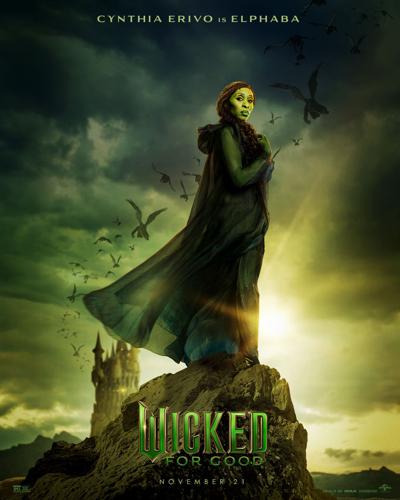
Cynthia Erivo as Elphaba on Wicked: For Good Poster (Image credit: Universal Pictures)
"Wicked: For Good" hits the box office this weekend and is already generating an early storm of reactions. Critics have settled around 71% on Rotten Tomatoes, while audiences are overwhelmingly enchanted, with a Popcorn Meter of 97%.
Director Jon M. Chu wraps up the final chapter (act two in the Broadway musical) of the Wicked film adaptation by leaning into the emotional core of the story. The film starts where the first one left off; with Oz in disarray as anti-“Wicked Witch” propaganda is distributed widely by the Wizard’s team of henchmen and flying monkeys.
The plot centers on the relentless hunt for Elphaba, now seemingly shunned and cast out by her former friends. Yet even in exile, she remains fiercely compassionate toward the Animals of Oz. In one of the film’s opening scenes, she descends on her broomstick to rescue them from the brutal forced labor of constructing the Yellow Brick Road.
Portrayed by the brilliant Cynthia Erivo, Chu’s casting of a Black actress feels deliberate, as Elphaba experiences prejudice from birth. Her character is constructed as someone who deeply cares about injustice because it resonates with her own experiences.
During an especially heartbreaking scene, the Animals of Oz are fleeing the land in an underground tunnel they’ve constructed beneath the Yellow Brick Road. While this serves as a clear allegory of the displacement that many immigrants and descendants of immigrants are currently facing, it also touches on the perspective of those who chose to remain as well.
Erivo sings, “No Place Like Home,” an emotional ballad written by Stephen Schwartz. The original song was produced for the film version of "Wicked" and pays homage to the famous Wizard of Oz line Dorothy recites.
The lyrics reflect on Elphaba’s feelings of being outcast in a place she calls “home.” She sings, “Why do I love this place that's never loved me? A place that seems to be devolving,” speaking directly to how ostracized she’s felt as she continues to fight for the rights of all in Oz.
Elphaba embodies the reality many first-generation individuals still live with today: the constant battle between honoring the “home” that shaped them and trying to find belonging in a place that has systematically discarded them.
Throughout "Wicked: For Good," Elphaba's journey reflects that tension. She steps into the role of the “villain” not out of malice, but out of conviction—believing that her own sacrifice may ultimately open a path for the Animals to return home to Oz. Her choices mirror the often unseen compromises first-generation individuals make as they fight for a future that may never fully embrace them, yet still desperately require their resilience.
In juxtaposition, Glinda (portrayed by Ariana Grande) serves to showcase how privilege and power can award access. This dynamic can be most felt during “For Good,” a song from the original Broadway musical where Elphaba sings, ”I'm limited, just look at me - I'm limited. And just look at you - You can do all I couldn't do, Glinda.”
"Wicked: For Good" explores the complex themes of displacement, justice, loyalty and friendship in a beautifully packaged finale. For many first-generation adults, like myself, the lessons feel painfully familiar. And while its Magical World of Oz is fictional, its message is unmistakably real: we are all capable of “defying gravity” and standing up for what’s right.











(0) comments
Welcome to the discussion.
Log In
Keep it Clean. Please avoid obscene, vulgar, lewd, racist or sexually-oriented language.
PLEASE TURN OFF YOUR CAPS LOCK.
Don't Threaten. Threats of harming another person will not be tolerated.
Be Truthful. Don't knowingly lie about anyone or anything.
Be Nice. No racism, sexism or any sort of -ism that is degrading to another person.
Be Proactive. Use the 'Report' link on each comment to let us know of abusive posts.
Share with Us. We'd love to hear eyewitness accounts, the history behind an article.